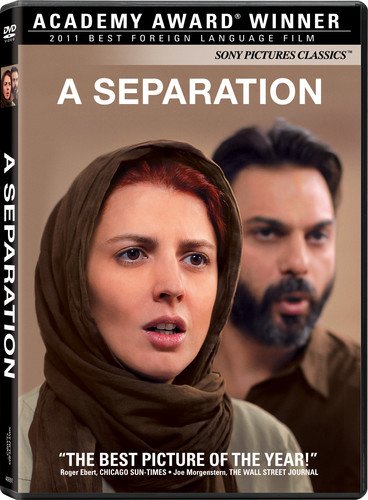
Here’s some unsolicited advice for presidential candidates: take a break from the campaign trail and go to see A Separation, the Academy Award nominee for both Best Foreign Language Film and Best Original Screenplay. You’ll have a great time, and you might even learn something.
A Separation was an international film festival favorite and Golden Globe winner and is, by far, the most engaging movie I’ve seen in recent memory, in any language. Writer/director Asghar Farhadi has crafted a subtly ingenious, edge-of-your-seat mashup of documentary-style verisimilitude, allegorical morality play, and Hitchcockian procedural.
Perhaps more importantly, the film has much to say about life in a country that may be the next place to “welcome us as liberators,” if certain saber-rattling politicians have their way.
A Separation is the story of Nader and Simin, a couple whose marriage is disintegrating as they try to care for a young daughter and an elderly parent. That the protagonists are Muslims living in Tehran is thematically incidental. The daily dilemmas these people face are universal.
As the film opens, Simin (Leila Hatami) has taken Nader (Peyman Moadi), her husband of 14 years, to divorce court. He refuses to emigrate with her and their 11-year-old daughter Termeh (Sarina Farhadi), even though Simin insists it is in the child’s best interest.
”I’d rather she didn’t grow up in these circumstances,” Simin tells the unseen judge.
The “circumstances” are, of course, Iran’s extreme religious and political climate, and the tightening restrictions on women in the three decades since the Islamic Revolution. And this is where A Separation achieves a sort of creative transcendence – it is both highly relatable to any viewer in any country and extremely specific to life in present-day, urban Iran.
Much of Farhadi’s storytelling brilliance is in establishing familiar domestic dilemmas with which we all can relate, then weaving in the unique challenges of life in an oppressive theocracy. Before we can emotionally disengage from Nader and Simin as somehow “other,” Farhadi manipulates the narrative to engender our empathy.
After all, who doesn’t want a better life for their child? What couple doesn’t struggle with daily challenges to keep a relationship healthy? What man or woman doesn’t have aging parents, or remember when they did? I defy you to watch Nader bathe the helpless creature his father has become and not envision yourself doing something similar in the future, or remember it from a past you hoped to never revisit. This is gut-wrenching stuff.
Simin and Nader are well educated, modern, and seemingly secular. She is a teacher, who dresses in Western-style clothing (save for a stylish headscarf that looks more like a fashion accessory than a religious requirement), smokes cigarettes, and refuses to defer to her husband. He is a banker who assists his daughter with her studies, encourages her to challenge authority, and rewards her when she raises eyebrows by pumping gas and demanding change from a male attendant.
He may not admit it, but Nader likely knows his daughter would benefit from leaving Iran. But he has made his decision: he will not desert his elderly father, regardless of how completely he has been decimated by dementia.
”Does he even realize you are his son?” Simin yells, imploring him to reconsider.
”I know he is my father!” Nader insists.
Simin moves in with her parents, and Nader hires Razieh (Sareh Bayat), a religious woman with a young child, to care for his dad. The arrangement is immediately complicated by their socio-economic and religious differences, Razieh’s pregnancy, and her hot-headed, unemployed husband Hodjat (Shahab Hosseini).
In a particularly harrowing scene, the old man disappears from the apartment and is discovered, wandering through busy traffic, by a frantic Razieh. Later that day, Nader returns home to find his father unconscious on his bedroom floor, his caretaker gone, and some money stolen. When Razieh returns and refuses to explain her absence or the missing money, Nader lashes out at her, with potentially tragic results.
There follows a twisty narrative of violence and recrimination, and Nader finds himself accused of murder and fighting for his own future. Soon all involved are forced to explore issues of ethics, morality, faith, truth, and justice.
Throughout, Farhadi’s pacing is disconcertingly flawless. You settle in to what initially seems like a piece of Iranian-style, kitchen-sink realism, when suddenly you find yourself in a domestic thriller, with a plot that unfolds like Hitchcock’s brilliantly spare The Wrong Man. And all the while, Farhadi keeps everything beautifully naturalistic.
The performances are consistently strong, with the supporting players (particularly Bayat, with her constant, nervous adjustments of her chador cloak) occasionally outshining the leads. As the daughter over whom Simin and Nader fight, Sarina Farhadi – the daughter of the director – is heartbreaking. And the final scene of the movie is a masterpiece of both realism and symbolism.
Art should be able to be enjoyed without context, and A Separation certainly meets that requirement. But mindful of the environment of censorship in which Farhadi made this film, and the impediments he overcame, his accomplishment is all the more stunning.
Equally stunning would be this film’s successful performance outside of the handful of major U.S. cities in which it is currently playing. And that’s why, sadly, the current crop of candidates likely won’t be able to see it any time soon. That’s their loss, and potentially the country’s.